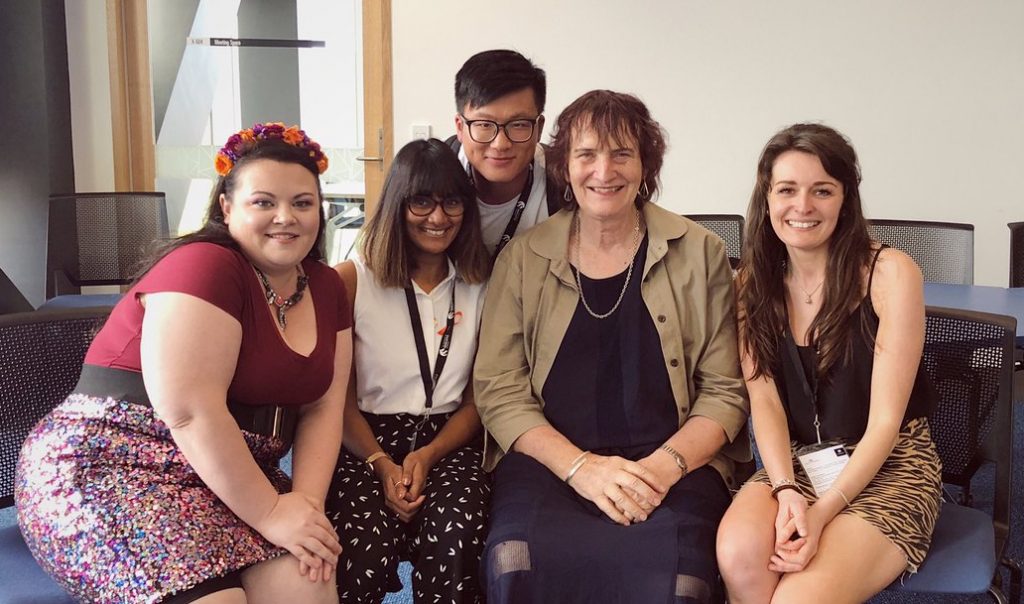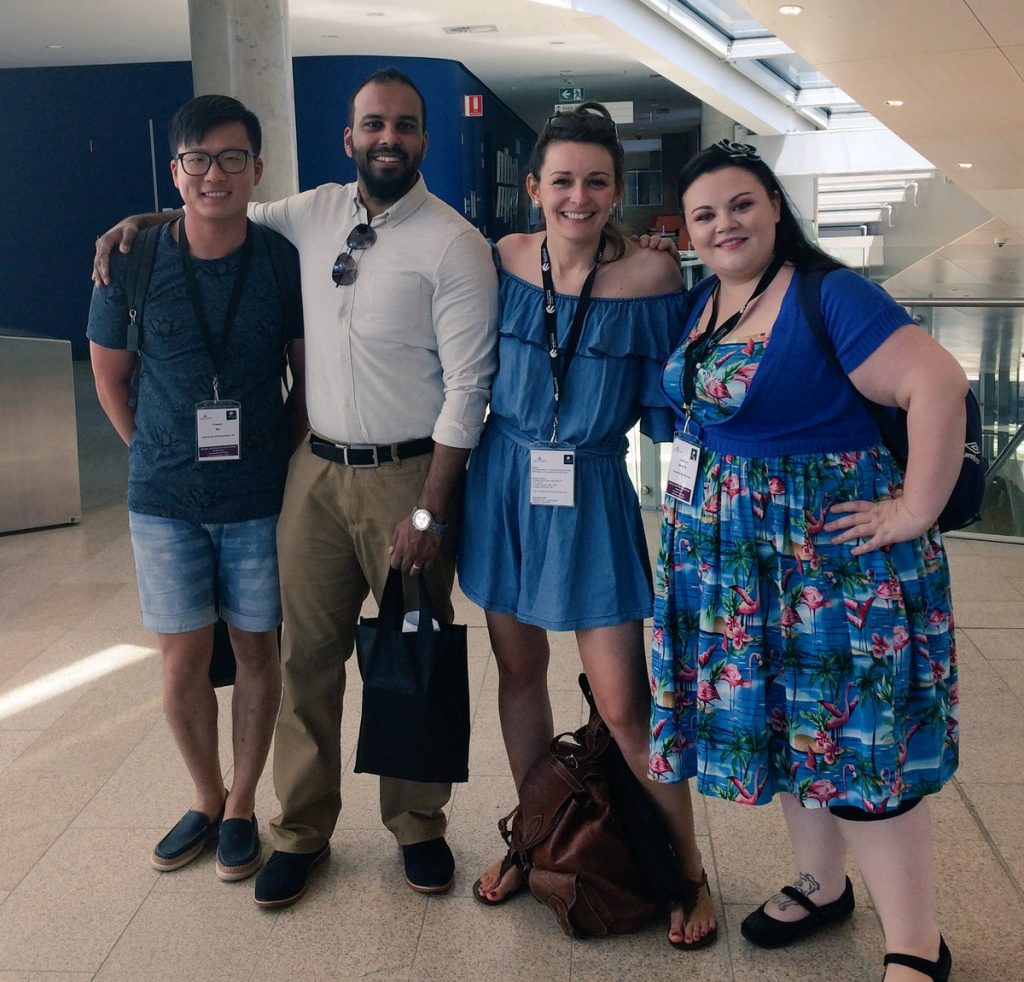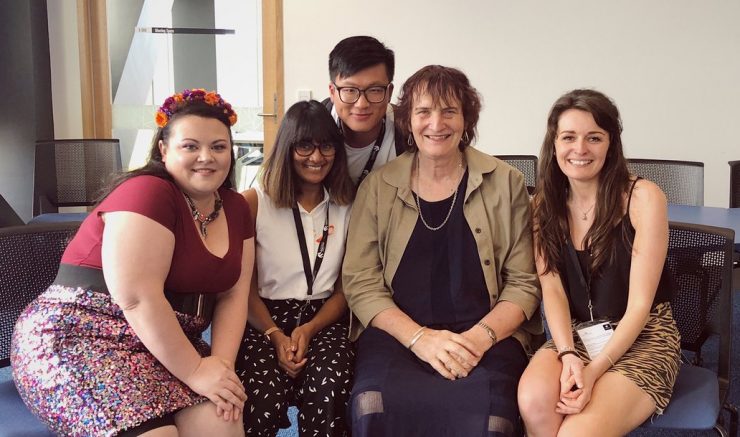This post is part of the Countdown to Conference (C2C) series. We would love to feature a brief blog post from you too! Visit our main Countdown to Conference page for details!
C2C: Why and How to GEA 2019 – Reflections from an early Career Researcher
Dr Carli Rowell, University of Glasgow, Twitter @carliriarowell
In this short blog post Carli Rowell reflects on her experiences of attending GEA 2018 one month after completing her PhD. Whilst Carli could compile an entire handbook of reasons of why and tips of how to GEA 2019 here she reflects on her top three reasons.
Related to Carli’s post, check out tweets from GEA Conference 2018 at the University of Newcastle, Australia #GEAConf2018 Wakelet

Exactly one month after my viva oral exam I boarded a plane at London Heathrow and embarked on the some ten thousand plus mile journey that was to take over 24 hours, included two transfers (Singapore and Brisbane), three planes and a bus ride. How did I feel? Well, in all honesty, I was exhausted, physically and intellectually. Excited yes, but mostly energy less in an all-encompassing mind and body kind of way (my soul was very much fired up!).
I was exhausted from the roller coaster of emotions that is part of the parcel of submitting a PhD, awaiting the viva, preparing for the viva, having the viva and then planning for life after the viva… Gosh life after the viva!! As I boarded the plane, located my seat and took out my laptop and begun to work on reducing my ‘to do list’ I could not help but ask myself if travelling over ten thousand miles to attend GEA 2018 and give a paper on my doctoral research was really a sensible idea? Perhaps I should have stayed back and opted for some much needed R&R instead? Or simply spent the time tackling with my ever expanding ‘to do’ list? This would have been the sensible thing to do right? Well… sensible I am not, nor have I ever been and for that I am glad. Having attended and returned from GEA 2018 here are my reflections on why I would encourage fellow PhD’s and ECR’s to attend this year’s GEA, albeit for us UK based academics it doesn’t quite involve a ten thousand mile international commute.

Attend GEA for it’s supportive, stimulating and collegiate environment:
The first and foremost thing that stands out as being at the top of list of reasons why I would encourage anyone to attend GEA, but especially PhD’s and ECR’s is due to the collegiate, supportive yet stimulating nature of the environment in which one is presenting. From the outset, from the very first moment of attending the ECR pre conference day attending GEA felt like attending a family gathering. Meeting new researchers from the field felt a lot like meeting distance relatives that you have never met but nonetheless treat you like family. GEA was a welcoming and friendly environment in which to present my doctoral research (an ethnography of working-class students at an elite university) to an international audience. The discussion and questions that follows the presentations given were stimulating and supportive. My advice to any one presenting or attending for the first time – leave the nerves at the door, you need not be worried about how your paper will be received or what reaction it might evoke. Just enjoy the process of presenting.
Attend GEA because it is good to have an intellectual holiday from time to time:
Conferences to me always feel like an academic holiday. Yes they are often characterised by long days, and deep intellectual thought and so, unlike an actual holiday you don’t really get the chance to turn your brain off. Nonetheless, conferences often feel like a holiday to because you get to go somewhere new, take a seat, sit back and listen to amazing research within and beyond ones field- and there is something rather luxurious about that. All, whilst sipping tea and scoffing cake (if you so wish). This provides a great opportunity to dip ones toes into a new area of research not previously considered, or to expand and consolidate existing areas of interests. Given this enjoyment, it does indeed feel like an academic holiday, or at least to me it does anyway. However, unlike holidays conferences take an immense amount of work. It is not simply a case of book and go. The conference is only possible because someone, somewhere, often along in collaboration with colleagues has taken the time to craft a conference proposal and then found the time to plan, host and execute said conference along with the help of many others from catering staff, to conference ICT staff (among many others). For this I am exceptionally grateful to the organising committee, GEA committee per se and all those involved.
My third and final reflection reads not much as a reason why one should attend by rather how to attend GEA 2019. Importantly, when at GEA, take time to take time out:
Conferences are highly sensory experiences, you see, think, hear and in some instances feel. The papers we hear often impact us on an affective level and not solely an intellectual one. Added to this at conferences we meet new people, learn new things and all whilst navigating around a new city / university. As much as academic conferences are sites of excitement and inspiration they can be sites of exhaustion. So my number one piece of advice is thus: do not feel like you need to attend everything. If you are tired take time to sit out of a session and collect yourself. And remember, collecting one’s self takes different forms. For instance, you might want to find somewhere quiet, to sit on your own where you won’t be bothered. Or you might want to take a walk outside, get some fresh air or maybe treat yourself to a drink at a nearby coffee shop. You might simply just want to take 5 minutes to talk about something totally unrelated to academia or the conference per se.

Collecting yourself might also come in the form of making the conscious decision to stay in bed that little bit longer, opting to re-charge your battery by starting your day a little later as opposed to dragging yourself half asleep to that 9am session or you might want to head home a little earlier. Importantly, whatever you do to recharge mid conference, try to do so without feeling like you are bunking off work, or feeling guilty that you’re not attending a paper when others have attended yours. Importantly, try not to give into the dreaded fear of missing out. Instead try to rechannel you’re thinking to understand that taking time out it as vital component of conference self-care. After all, you can’t pour from a glass that’s empty.
Biography
Carli Ria Rowell is a Postdoctoral Research Fellow at the University of Glasgow in the GCRF ESRC funded Centre for Sustainable, Healthy and Learning Cities and Neighbourhoods. Carli is a sociologist, feminist and ethnographer and much of her work grapples with issues pertaining to contemporary social, spatial and geopolitical (im)mobilities particularly in relation to educational (in)equalities. Prior to Glasgow Carli held positions at the University of Sussex and the University of Warwick. Her ESRC PhD (Warwick) was an ethnography of working-class students at an elite university. She is passionate about the sociological imagination, feminist research and teaching and inclusivity within academia and currently serves on the Executive Committee of the Feminist and Women’s Studies Association (UK & Ireland) and as a co-convenor of the British Sociological Associations Early Career Forum.
If you are attending conference, let us know on Twitter using the hashtag: #GEAconf2019


